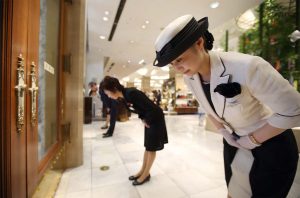The character of the Japanese people
(Lesson – order of adjectives before nouns – I level)

Every where in Japan people bow to show respect to all people. The lower they bow the more respect they have for the person specially if the person is a high official.

People bow upon greeting and upon leaving. Respect is highly practiced and regarded in Japan.
Polite and respectful–
When we came to Japan for the first time in 2014, we were overwhelmed by how “polite” the Japanese people are. Taking the metro train from Narita airport to downtown Tokyo, we were met by many young and old taxi drivers at the downtown metro train station. We summoned a middle-age polite taxi driver who greeted us with a deep bow. He had gray hair but a youthful face. He wore nice clean white gloves and a grey taxi suit with a matching hat. When the polite taxi driver bowed to us to show us respect, we copied his gesture and bowed to him. He asked us in his broken English where we wanted to go. I showed him a paper written in Japanese with the address of our hotel. The helpful and polite taxi driver said, “Yes, I know where your hotel is.” So he took our luggage and placed them in his trunk. Then he politely opened the door for us and signaled to us to enter his taxi and have a seat. As we entered, he bowed again. Entering his taxi we noticed the cleanliness: the plush seats, the clean floor, and the spotless windows. His taxi had a nice fragrant smell – no cigarette or left-over food smell. It was a pleasant smell and the seats were very comfortable. I decided to make the initial talk and asked him if he was married. He asked me to repeat, so I repeated the question. He nodded his head and said, “Ah, yes I married. Have daughter.” I knew right away that I needed to talk real slow and more clearly. Then I asked him, “Where can I eat good sushi near my hotel.” He said, “Your hotel has restaurant but sushi OK. But best ask hotel clerk for sushi place.” I said, “OK.” Then I asked him, “Where you learn English?” He said, “Ah my daughter learn English school. So she learn me.” I said, “Oh! You have a good daughter. And your English is good.” As we talked, I felt like he enjoyed talking to me and seemed unafraid to practice his English. When we arrived at our hotel, the polite taxi driver printed out the cost of the fare from a small machine in his console of his taxi. The short tiny paper was easily readable and it indicated the cost of the fare which was ¥5000, almost $50 in U.S. money. I knew that in Japan there is no tipping in any situation: taxi, restaurant or hotels. To tip someone is actually a little insulting; the services you’ve asked for are covered by the price given. After I paid the exact amount to the taxi driver, the polite taxi driver stepped out of his taxi and opened the door for us. Then he took out all our luggage and placed them in front of our hotel. A polite hotel worker, who bowed to us to greet us and show his respect, picked them up and carried them into our big luxurious hotel. When we entered, all the hotel clerks bowed to us and said, “Konbawa. Good evening. Welcome to our hotel.” As new tourists in Japan on our first day we felt very comfortable, happy, and excited to be in Japan. Moreover, we felt welcome, respected, appreciated, and honored by the people bowing to greet us along the way. This act of bowing to show respect and politeness is so common throughout Japan. In Japanese the term for politeness is called, “reigi tadashii” (れいぎただしい). This bowing is often preferred by the Japanese than handshake to show their respect to you, which clearly showed how they were very polite and respectful. Respect and politeness in Japan are also exhibited when younger people greet an elderly person or relative. In Japan, the older a person gets the wiser he or she is considered and the more respected that elder becomes. To use informal language with an older person is very disrespectful. Thus, younger people are always respectful to older people because they are revered as the ones who are wise. They call this “tanin ni taishite keii wo hyo suru” (たにんにたいしてけいいをひょする) meaning to show respect to the elder or to the wise people. In Japan, we met many polite and respectful taxi drivers, hotel clerks, tour guides, restaurant workers, train workers, and practically every Japanese people we came into contact along the way. No doubt the Japanese people set the standards of respect and politeness at a very high level. To us respect and politeness go a long way when discovering a new culture. For this reason, our trip to Japan was one of the best experiences we have ever had.
Grammar – the order of adjectives before nouns
| 1 | 2 | 3 | 4 | 5 | 6 | 7 |
| Opinion | size | age | shape | color | origin | material |
| wonderful | tiny | young | round | blue | Japanese | silver |
| fantastic | large | elderly | square | orange | Filipino | gold |
| intelligent | gigantic | middle-age | round | black | Korean | wooden |
| exciting | short | old | straight | red | Russian | rubber |
The order of adjectives is “opinion-size-age-shape-color-origin-material.”
Examples: 1. A beautiful (opinion) young (age) Japanese (origin) lady helped us to find the correct metro station.
2. Latifa has the same short (size) curly (shape) brown (color) hair as her mother.
3. My wife gave me a beautiful (opinion) striped (shape) velvet (color) silk (material) tie for my birthday.
4. My wife’s father is an intelligent (opinion) short (size) elderly (age) Vietnamese (origin) man.
